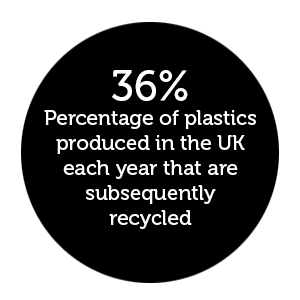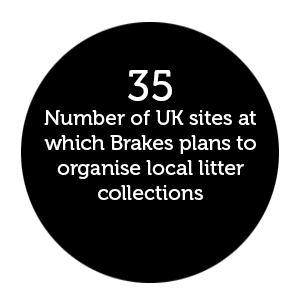In the UK, 2.2m tonnes of plastic packaging are produced every year, but only 0.8m tonnes are recycled, according to sustainability charity Waste and Resources Action Programme (WRAP).
Foodservice wholesaler Brakes has pledged to reduce its use of the most environmentally-damaging plastic packaging, including single-use and hard black plastics that cannot be recycled.
Black plastic food trays are not recycled in the UK because of the carbon pigment in the plastic, which sorting machines cannot detect.
 Discussing his business’ move, Brakes UK CEO Hugo Mahoney says: “Foodservice, like retail, has a leading role to play in being a responsible user of plastics. We may be a less visible industry, but we service customers across many sectors, including restaurants, schools, hospitals and coffee shops, and we know consumers are asking our customers what they are doing about plastics when they visit the pub or deli shop, for example. So, we are helping our customers by giving them the solution they need, by committing to removing non-recyclable, hard black plastic from our own-brand products by the end of 2020.
Discussing his business’ move, Brakes UK CEO Hugo Mahoney says: “Foodservice, like retail, has a leading role to play in being a responsible user of plastics. We may be a less visible industry, but we service customers across many sectors, including restaurants, schools, hospitals and coffee shops, and we know consumers are asking our customers what they are doing about plastics when they visit the pub or deli shop, for example. So, we are helping our customers by giving them the solution they need, by committing to removing non-recyclable, hard black plastic from our own-brand products by the end of 2020.
“Our commitment is not about an individual business – it is about the industry working together for a more sustainable future. We hope that our stance will encourage other foodservice wholesalers, large and small, to take a similarly proactive approach to addressing this issue.” With that call to arms in mind, there is a lot your business can do when it comes to cutting down on the amount of plastic you use.
Here, leading wholesalers talk us through the changes they are trying to make, the difficulties they are encountering and the solutions they have found.
Products
This year, numerous high-street bar and eatery chains have removed or announced plans to stop offering their customers plastic straws.
Darren Gaulton, managing director at Bristol-based Charles Saunders Foodservice, predicts that this trend will become more prominent in wholesale.
“There is currently – and will continue to be – a huge change from plastic products into compostable and wooden products,” he says. “It is going to be a massive point in our industry, and the ones who have the right products at the right price and who can switch people across will be successful over the next few years.”
Matthew Moare, operations co-ordinator at The Kentish Match Company, which has won awards for its green credentials, says that the firm is on board with the move away from everyday plastic items. “We have sourced replacement products to sell, such as paper straws instead of plastic straws, and we are swapping our plastic pegs for wooden pegs. I am in discussions now to stock reusable ‘bag for life’ shopping bags to supplement our bags. We still stock both variants, but as public perception changes, the sales of non-plastic products will increase.”
However, as Nicki Stribley, sales director at Somerset-based wholesaler Queenswood Natural Foods, notes, the current plastic alternatives on offer are no silver bullet. “Finding plastic alternatives that are fit for purpose is challenging,” she says. “For example, we use plastic packaging for all our own-brand pre-packed products, and we are currently trialling plastic alternatives such as vegetable-based materials. The new solutions tick all the ‘green’ boxes, but they cannot protect the products or serve the purpose as effectively as plastic packaging.”
Cost
Hygiene is another issue faced by those seeking to minimise the use of plastics in their business.
Graham Jenkins, managing director of Cumbria-based Pioneer Foodservice, says that his firm’s on-site deli team will be implementing fully-compostable paper window bags made from wood pulp.
But he cautions: “There are many challenges we face. We are bound by food safety and hygiene regulations in how we package meat and raw products, and as we take our responsibilities seriously, we have to use the safest methods. Plastic is considered a hygienic method of packaging.
“We also have to consider costs. Many materials that are made out of recyclable products or that are fully compostable are more expensive than single-use plastic. Are customers happy to pay more for products that are sold in a ‘green’ container? This is a challenge for us, as we work in a highly competitive industry.
“We are continuously evaluating our use of packaging and look to tap into industry innovations.”
Christina Spinks, head of marketing at London-based EFG Foodservice, says that the biggest difficulties her business has faced are cost and perception. As she notes, consumers are used to paying low prices and while many are keen to reduce waste and be greener, in EFG’s experience, most seem put off by the cost.
Cost is not the be-all and end-all of getting buy-in for plastic alternatives, though. “Where cost is less of an issue, we are met with concerns over the quality of plastic alternatives,” Spinks says. “This is completely understandable, as changing the products you use represents a risk. We overcome this by supplying sample stock to trial at no cost – usually, this is all it takes to convince our customers.”
Bidfood has sought to help its customers overcome their reservations by providing them with as much information as possible.
Shirley Duncalf, head of sustainable development at the foodservice wholesale giant, says: “Our catering supplies team has worked with WRAP, our main suppliers and customers in the food-to-go market to produce a ‘Food 2 Go’ packaging leaflet designed to better educate customers and sales in making informed, sustainable and suitable choices with packaging. The leaflet explains the pros and cons of each material and how to handle the materials on-site through best practice, and explains how the materials affect the environment at end of life. The document clearly indicates and identifies which materials can be recycled or composted, to ensure that all packaging items are being disposed of correctly.”
Deliveries
Many deliveries in FMCG wholesale have traditionally involved the use of plastic wrapping. But this is not a necessity.
EFG uses plastic pallet wrap to keep goods secured during transit. Waste pallet wrap is recycled on site, but the business will be trialling biodegradable pallet wrap later this year. “We are hopeful this will present a strong enough alternative to plastic wrap,” Spinks says.
Kentish Match’s deliveries are made in cardboard boxes, which are then recycled. However, pallet deliveries require the use of plastic shrink-wrap. Moare has attempted to offset this by trying to find a way to recycle the plastic shrink-wrap Kentish Match gets from the pallet deliveries it receives.
But he says he has been unable to find anywhere that does this. “This is our biggest waste to landfill and until it is resolved, we cannot overcome this issue,” he laments.
Bidfood has already experienced similar issues, although its Paddock Wood depot is currently exploring alternatives to shrink-wrap, which is used within the warehouse, as part of a company-wide plan to reduce plastic consumption within the workplace.
Queenswood, meanwhile, has removed all plastic packaging from the monthly brochures that it posts to customers. Opting for this ‘naked’ packaging approach enables the business to reduce a significant amount of the plastic packaging it uses, which has to be thrown away every month, according to Stribley.
But this scheme is not without its issues. “The plastic did a good job of protecting the magazine so that it landed with the customer in a presentable condition,” she notes. “We find that due to the lack of protection from the elements, some brochures land with customers damaged and – if it has been raining – wet and sometimes a little grubby. That being said, our customers are of the same mindset and do not mind receiving a slightly damaged brochure in the post if it means reducing the amount of plastic we use.”
Staff
 The consistent theme in successfully reducing the amount of plastic you use is getting staff on side.
The consistent theme in successfully reducing the amount of plastic you use is getting staff on side.
Bidfood’s Duncalf says: “In a bid to eliminate unnecessary single-use plastics, we have removed all disposable plastic cups and takeaway coffee cups from our Business Support Centre in Slough. We are planning to roll this out across our sites, to encourage employees and visitors to use reusable mugs and cups.
“Offering products, tips and recycling stations is fairly simple, once you overcome the minefield that is selecting the right material. The main issue is the lack of infrastructure and clarity from the waste operators.”
Elsewhere, EFG is looking to install a tap that provides filtered water to reduce plastic bottle usage. “Michael Spinks, our MD since 1985, has long held a strong view on our need to reduce our impact on the environment,” Spinks says. “His vision and passion is pretty contagious, so it is no surprise that most of our staff fully support our efforts on this front. Additionally, the public awareness of our need as a human race to reduce our plastic usage is a huge benefit. If we did not have staff buy-in, this project would have been
a lot tougher to implement.”
Duncalf concurs: “The amount of media attention on plastics and packaging at the moment has certainly helped overall awareness. We have found that everyone wants to be educated on this issue in some capacity and there is a real thirst for knowledge on the subject. They want to know not only how they can advise their customers, but also how they can help at home with recycling in their own houses.”
At Queenswood, the aforementioned initiative to scrap the plastic used for the monthly brochures was an idea generated by the sales team itself.
Pioneer, meanwhile, has a dedicated member of staff with systems and procedures in place to track information and submit regular returns.
“Our staff is educated on plastic waste management and regular meetings reinforce messages about recycling and reuse and provide a forum to discuss new ideas and long-term goals,” Jenkins says.
Brakes’ Mahoney’s rallying cry should be heeded by everybody in this channel – and as the firms spotlighted here have shown, there are various little and large measures you can implement post-haste.
Read more: The government is focused on reducing plastic packaging: what will change?
Brakes’ plastic reduction checklist
1. Over the summer, Brakes and a leading charity will launch an education programme for its 7,500 staff that will also include local initiatives such as a plan to pick up litter in local communities around its 35 sites and then recycle the results.
2. Brakes uses internal channels including on-site plasma screens, monthly videos, noticeboards and its internal Facebook group to share messaging, educational videos and leadership messages about the importance of making a contribution.
3. Brakes is working with customers and suppliers on improving labelling, with the intention of making recycling messages much bolder and clearer, thereby improving recycling rates.
4. The firm plans to continually measure, review and evolve its so-called ‘2 Zero 20’ pledge targets to make sure it is tackling plastics responsibly for the long-term, working with customers, suppliers, staff and industry associations to do so.







